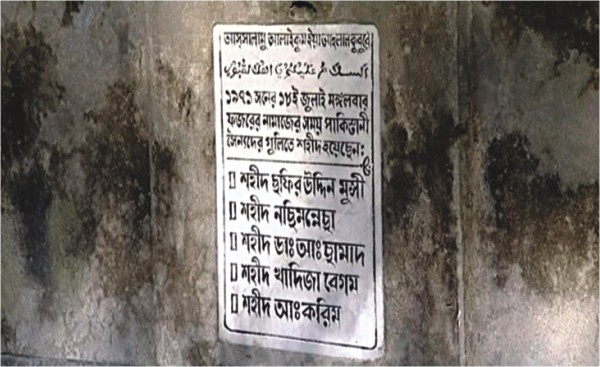
 Graveyard of Shaheed Safiruddin Munshi and his family. Photo: Col. Sajjad
Graveyard of Shaheed Safiruddin Munshi and his family. Photo: Col. Sajjad
Cruelty on an Imam and his family
Boitapara is a small locality under Bhandabo village. The village is located at 2 km from east of Mollikbari union under Bhaluka upazilla of Mymensingh district.
Safiruddin Munshi used to reside in this village with his extended family. Safiruddin Munshi was the Pesh Imam of the Boitapara Mosque. Soft spoken and gentle Safiruddin was well respected and loved by all villagers. In addition to being an Imam of the mosque, he used to also teach in the Madrassa adjacent to the mosque. He was a very popular teacher too. With the earnings from his small piece of land and the charity given by villagers for leading the Prayer in the mosque and teaching in the Madrassa, he was leading a decent life. During the period of 1971, in that area the main cultivable crop was jute and the area was covered by jute plants. Next to his house flew a small river called Rupi. On the north of Rupi River there was a village named Medoari. Safiruddin Munshi had four children. He had a happy family. His brother Abdus Samad lived in the next door.
In the early hours of 15 July, 1971, Safiruddin Munshi and his wife Nasimunessa were preparing for morning prayer. Suti Mondal who was the Moazzin of the mosque was giving Azan, the call for Prayer. Suddenly there were sounds of fire around the area and few Pakistani soldiers were seen rushing towards the mosque. They started beating Suti Mondal who fell unconscious. He could not complete the call for Prayer.
Simultaneously, a group of soldiers numbering about 30 along with their local associates were seen rushing towards the house of Safiruddin Munshi. They quickly surrounded the place. The orders were coming from a man in Khaki uniform who was possibly a Lieutenant or a Subedar of the army. There were also about 8/10 people in civilian clothes whose faces were largely covered with cloth. They were the local collaborators of the Pakistan army who did not want to be identified as such and hence had covered their faces with cloths. The collaborators were seen advising the army commander. Safiruddin Munshi and all his family members were ordered to come out of their home. Safiruddin Munshi, his wife Nasimunnesa, his brother Abdus Samad, brother's wife Khadeja Begum came out of the house. They were ordered to line up in the courtyard. The Army commander was speaking in Urdu and one collaborator was translating his words in Bengali. Collaborators shouted, “You are an associate of freedom fighters. Freedom fighters are hiding in your house.” Safiruddin begged telling that he is not an associate of freedom fighters, there are no freedom fighters hiding in their house. Army could check the house if they desire. He further tried to explain that he was an Imam and never told lies. The collaborators kept on shouting and telling that they have proof that this family is linked up with the freedom fighters. Both the Imam and his brother tried to explain their innocence, swearing by the Holy Quran but nothing seemed to have changed the mind of the army personnel. The soldiers took position and within seconds shot dead all four members of the family. Khadeja Begum had a daughter of two years named Rokeya Begum. She came crawling to the mother for milk but a collaborator picked her up and threw her into the pile of paddy straw. She survived miraculously.
Abdul Karim, the 15 years old son of Abdus Samad watched the horrific murder from the window of his room. He was a strong lad. He could not take it anymore. In the spur of a moment, he took a kitchen knife, came out of his room, ran towards a soldier and stabbed him in his stomach. Instantly Abdul Karim was shot dead by a soldier nearby.
After completing their mission the Pakistani soldiers and their collaborators burnt the entire house of Safiruddin Munshi and the dead bodies were thrown into the fire. They left the village.
In the evening, the villagers who had run away came to the burnt house of the Imam. They found that the dead bodies were charred beyond recognition. To their horror they also found five sets of Holy Quran which used to be recited by the Imam were burnt. It was a scene beyond comprehension.
That evening the villagers buried the five dead in a compound on the bank of the Rupi River. The graves are well preserved. The names of the dead are engraved on the side of the wall of the grave.
The villagers did not know why the killing had taken place. Later they came to know that a group of freedom fighters were going by boat at night by Rupi River. They were hungry and came to the house of Safiruddin Munshi and requested for some food. Safiruddin Munshi and his family gave some Dal and Bhat to the hungry young men. The freedom fighters did not comprehend that for this generosity the Imam and the family would have to pay the highest price. Giving food to the young and hungry patriots was the crime committed by Imam and his family who were kind-hearted people.
The people of the village still mourn the death of the Imam and his family. Such a loss is not something which will evaporate with time.
Written by Lt Col Sajjad.
©2012 thedailystar.net. All Rights Reserved